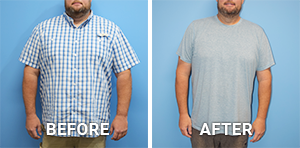If you’ve experienced weight regain after a sleeve gastrectomy, you may be a candidate for revision surgery. Our practice is headed by the expertise and leadership of Dr. Bonnor, MD, FACS, FASMBS. To get started, call (281) 579-5638 or fill out a contact form to request a consultation.
Contents
Weight Regain After Sleeve Gastrectomy?
Anatomically, weight regain can be caused by gastric dilatation in part or all of the previously sleeved stomach. After sleeve surgery, patients are restricted to liquid nutrition, then progress to soft foods, and finally to solid foods. With time, patients can slowly introduce more and more food. This anatomical difference, compounded with maladaptive eating habits that developed before surgery, can ultimately work in tandem and lead to significant weight regain. Factors such as depression, alcohol use, hormone dysregulation, a sedentary lifestyle, and even psychiatric disorders can place one at higher risk for returning to significant weight regain post sleeve gastrectomy. (1)
Research also shows that individuals who have a very large gastric fundus may have an increased risk of experiencing weight regain. (2)
Candidates and Evaluation for a Sleeve Revision
Candidacy for a sleeve revision is slightly different from the qualifications required for primary surgery as opposed to secondary or revision surgery. Firstly, you must have insufficient weight loss or weight regain at least 1 year or more after the initial surgery. Insufficient weight loss is defined as a failure to lose more than 50% of excess weight or a BMI of 30 or more. (3) Besides weight regain, other reasons for a sleeve revision include gastroesophageal reflux disease (GERD) and dysphagia (difficulty swallowing). An upper endoscopy, as well as an upper gastrointestinal barium study will assess your candidacy for revision surgery.
Sleeve Revision
Dr. Bonnor performs the entirety of the sleeve revision using robotic assistance, a minimally invasive technique that has been shown to add safety and improve outcomes specifically in more complex cases such as revision bariatric operations.
Overall revision procedures require four incisions typically without drains. Dr Bonnor also uses a special technique for blocking the abdominal wall nerves to minimize postoperative pain after surgery and thus improve patient experience.
Recovery
A sleeve revision typically requires an overnight stay at the hospital. Dr Bonnor has developed a postoperative protocol to control your nausea and pain. In addition, a regimen of breathing exercises post surgery will help prevent pneumonia. The nursing staff will encourage you to walk as this mechanism helps prevent the development of blood clots post surgery.
For the next 2 weeks, you will have to follow a liquid-based diet, and you will be able to slowly transition to puree, and eventually, soft food. Even for revision surgeries, the recovery process is very manageable. Most patients can get back to office work in 7 to 10 days and are able to get back to light exercises at the gym in 3 to 4 weeks.
How to Maintain Weight Loss
After a sleeve revision, you should consider taking the following steps to promote both lasting results that will lead to better quality of life:
- Consider exploring your eating behaviors with professional behavioral therapy. Sometimes, trauma, anxiety, and clinical depression may contribute greatly to this harmful coping mechanism.
- Consult a nutritionist on how to incorporate healthy eating that encourages satiation. In general, you should try to eat high-fiber and high-protein foods and less food with high amounts of salt, sugar, and fat.
- Find an exercise plan that works for you. Consider talking to a physical therapist about what kind of exercise program will be suitable for your physical capabilities. Incorporating exercise not only helps you lose weight but also increases your longevity.
Cost of a Sleeve Gastrectomy Revision in Houston
To get a full understanding of the total cost of your sleeve revision at Texas Endoscopy Associates, book a consultation with Dr. Bonnor by calling (281) 579-5638 or by filling out his online form. There are financing options available.
Commonly Asked Questions (FAQ)
Can I regain weight after a sleeve revision?
It is possible to fail to lose excess weight after a sleeve revision. In a resleeve or recalibration of a previous gastric sleeve, the gastric pouch of the first sleeve gastrectomy is further reduced in size, encouraging patients to eat smaller portions.
Are sleeve revisions covered by insurance?
Every insurance policy is different. Please check with your insurance carrier. Patients may be required to go through a pre-surgical weight loss program as determined by their insurance policy to show their commitment to lifestyle changes.
Are sleeve revisions more effective than weight-loss medications like semaglutide?
Sleeve revisions and all bariatric procedures tend to offer better results over weight-loss medications which may have significant side effects and high failure rates once you stop taking this medication. Bariatric surgery, on the other hand, has overall low complication rates and higher predictability, creating the groundwork for more permanent and sustainable weight loss.
References
- Noria SF, Shelby RD, Atkins KD, Nguyen NT, Gadde KM. Weight Regain After Bariatric Surgery: Scope of the Problem, Causes, Prevention, and Treatment. Current Diabetes Reports. 2023;23(3):31-42. doi:https://doi.org/10.1007/s11892-023-01498-z
- Saliba C, El Rayes J, Diab S, Nicolas G, Wakim R. Weight Regain After Sleeve Gastrectomy: A Look at the Benefits of Re-sleeve. Cureus. Published online October 14, 2018. doi:https://doi.org/10.7759/cureus.3450
- Park JY, Song D, Kim YJ. Causes and outcomes of revisional bariatric surgery: initial experience at a single center. Annals of Surgical Treatment and Research. 2014;86(6):295. doi:https://doi.org/10.4174/astr.2014.86.6.295









